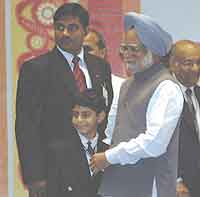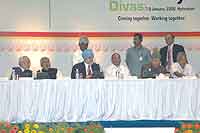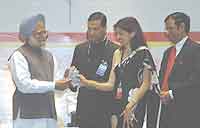|
The three-day conference was attended by PIOs from some 110 countries worldwide. Malaysia, which has one of the largest concentrations of PIOs—over two million—sent the biggest contingent with over 240 delegates led by works minister Datuk Seri S. Samy
Vellu. Samy Vellu in his paper presented at the conference had called on the Diaspora to set up a Diasporic News Network for global exchange of information between India and the over 25 million people of Indian origin living outside India.
“It is significant to note that after three Pravasi Bharatiya Divas, the 2006 global forum has now finally started to concentrate more seriously on the diaspora agenda,” he said.
At the plenary session o n ‘Diaspora and Culture’ chaired by Minister for Culture and Urban Development S. Jaipal Reddy, it was announced that the Indian Council for Cultural Relations
(ICCR) would set up a Centre on Indian culture in Washington. ICCR chairman Karan Singh said in his keynote address: “For 15 years I have been trying to set up a cultural centre in Washington but I have not succeeded.” n ‘Diaspora and Culture’ chaired by Minister for Culture and Urban Development S. Jaipal Reddy, it was announced that the Indian Council for Cultural Relations
(ICCR) would set up a Centre on Indian culture in Washington. ICCR chairman Karan Singh said in his keynote address: “For 15 years I have been trying to set up a cultural centre in Washington but I have not succeeded.”
At the interactive session on states, chaired by Montek Singh
Ahluwalia, deputy chairman of the Planning Commission, while Gujarat Chief Minister Narendra Modi and Bihar’s Nitish Kumar — a study in contrast, after a FICCI report put their states on the top and at the bottom respectively — spoke in chaste Hindi, trying to woo NRIs to invest in their states, the other speakers, including J&K CM Ghulam Nabi
Azad, seemed to concur with the view that ‘united we stand, divided we fall’.
And the common message was: we are not here to
criticise, but to work in tandem, as aptly put by Maharashtra CM Vilasrao
Deshmukh, after Modi went a little overboard in saying “Gujarat is way ahead, could be compared with not Maharashtra or Goa but with Germany and Japan”. in tandem, as aptly put by Maharashtra CM Vilasrao
Deshmukh, after Modi went a little overboard in saying “Gujarat is way ahead, could be compared with not Maharashtra or Goa but with Germany and Japan”.
The CMs of Andhra, Bihar, Gujarat, Jammu and Kashmir, Kerala and Maharashtra, so different in style and hues (read party affiliations) were a picture of poise. Leaders of Rajasthan, Punjab, Tamil Nadu and West Bengal also participated.
While Azad sought investment in hotels, tourism, resorts, adventure and leisure sports, amusement parks, golf courses, ropeways in “one of the most beautiful parts in the world”, “the investor-friendly state” of Andhra boasted of single point clearance,
AP.INVEST, ‘first contact point’ for NRIs and foreign investors. The State Investment Promotion Board meets under the chairmanship of the chief minister and provides all
c learance for mega projects, YSR Reddy added. learance for mega projects, YSR Reddy added.
PBD-06 also saw the emergence of a demand to have the next edition in a Gulf state. The Dubai-based Indian Business and Professional Council (IBPC) issued a call for the next diaspora meet to be held in Dubai, Jeddah, Kuwait or Muscat.
Suresh Kumar, president of IBPC was quoted by the media as having said: “Only if you hold such events in the Gulf you will really know the kind of problems faced by the Indian community. Gulf Indians contribute the maximum to India in terms of remittances and the government of India owes them a patient hearing and sorting out their grievances.”
|